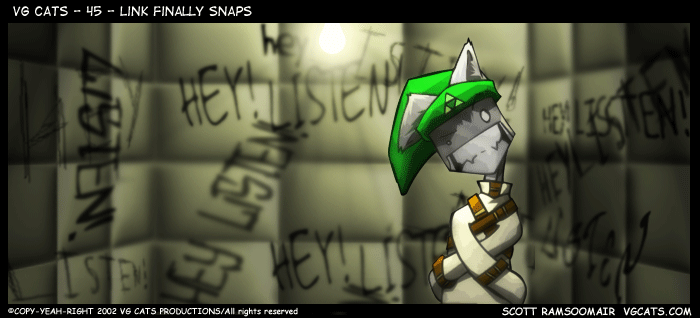Trending
Opinion: How will Project 2025 impact game developers?
The Heritage Foundation's manifesto for the possible next administration could do great harm to many, including large portions of the game development community.

Featured Blog | This community-written post highlights the best of what the game industry has to offer. Read more like it on the Game Developer Blogs or learn how to Submit Your Own Blog Post
A discussion of the importance of communication as a core component of collaboration in game development and a few lessons on ways to promote positive and effective communication within the team.

[This started as a post about dispersed teams, but the content was too much for one post! This is the first, which discusses communication tacts (a popular topic this week!). Questions/comments? You can always tweet @Shibusuke. Reblogged from Abyssal Arts' website.]
When we started Abyssal Arts, we knew from the start that we were going to be working across time zones, countries, and language barriers. We’re hardly unique in this respect—from AAA teams to little indie outfits like us, nearly every developer has to confront this reality at some point. Still, I have seen firsthand that this can make or break a project, and that leads me to the point of this post:
Communication. It’s a thing, and it's important.

Link to source: http://www.vgcats.com/comics/?strip_id=42
Powerful stuff, right? I do mean that literally, though, so I hope you bear with me. Not to sound too touchy-feely, but communication is powerful. I've worked on AAA projects that suffered (a lot) because the teams involved did not communicate with one another positively or effectively. Unsurprisingly, without communication, or with poor communication, a team can devolve from extraordinary into angry, suspicious, and missing deadlines. On the flip side, I’ve been involved with projects that had insane deadlines and ridiculous levels of complexity yet succeeded because the team, even with major cultural and linguistic hurdles to overcome, established strong, positive working relationships because they really wanted to communicate.
Very well, you say. Communication is important, we get it. Why is it a “thing,” though? We communicate all time, from emails to video conferences, and yet it is surprisingly easy to forget that clear communication should be a priority and requires dedication as well as focus. The communication is not incidental. The communication is a matter unto itself, and must be treated that way. So, without further ado, here are a few suggestions for implementing effective communication:
1. Ideally, someone will take charge of communication. In a perfect world, this is centralized in one or two individuals who can focus on the task without detracting from other work or where communication is complimentary to their work (producers, project managers, etc.), but communication can be undertaken by anyone, really, from Producer to Coffee Fetcher (these happen to be the same in our office, and dear self, please remember to get dark roast next time). The important thing is that your communications person keeps channels open between all parties, knows how, when, and on what platforms communication takes place, shares all relevant information in a timely manner, and projects enthusiasm. Speaking of emotions …
2. Emotional connections will help a great deal. Face to face time helps establish a connection that email, phone, and even video conference cannot match. However, making sure that your team takes the time to communicate on a personal level (regular video conferences, emails, etc) can help alleviate this. Team members should know about the people they’re working with are like – not just that Jim codes, but that Jim enjoys kayaking and has a dog. But most importantly, if possible, even if it's expensive or difficult, try to bring everyone together in person at least once, as even one meeting can significantly improve the efficacy of communication and the quality of the relationship down the line.
3. On the flip side, emotions do not always help communication. This is one more reason that a central communications hub can be useful. I have been on projects where poor communication, often a result of several separate-but-related factors, soured performance to the point that the collaboration was nixed. Had effective communication existed in that environment, it may have been possible to address the root issues as soon as they appeared and to focus on what needed to be done to continue the collaboration. When the relationship allows for it, though, I've found that reaching out as soon as something is perceived to be amiss can not only address the issue at hand, but also create a deeper mutual understanding and trust between teams and people (Oh, that's why it came in like that). Proactively improving communication is a key skill, and a third party can sort out some of the emotional baggage (or help sort it out).

Because I wrote the words "emotional baggage". Link to the source: http://fairygodflea.deviantart.com/art/Emotional-Baggage-125993864
4. Know your biz. Where are documents uploaded? Who can edit them? Where is the reference and concept artwork? What tools are we using to communicate, and who’s looped in on which subjects? Ideally, every single person on the project knows whom to contact about issues they have, but this isn't always everyone's focus, and especially in dispersed teams, it's hard to keep track of names, voices, faces, responsibilities, and contact methods. Still, if Matt uploads some artwork, Sue and Kosuke should both know how to comment on it. If Aaron needs information about the dialogue, he should know whom to contact, and how to contact them.
Ideally, we would all be perfect communicators, with flawless retention, and perfect working relationships, but alas, this is not an ideal world and we can’t have everything (I want to be able to snowboard to work, but my floor is flat and it doesn't snow indoors). But what we can do is proactively promote effective communication among team members, with central people able to sort out any misconceptions, misunderstandings, or misdirected questions as soon as they arise. Prioritizing communication as a focus of its own makes a surprising number of issues disappear entirely.
[Looking at the images in the post, I think subconsciously I'm trying to tell you how difficult this can really be... Keep at it!]
Read more about:
Featured BlogsYou May Also Like